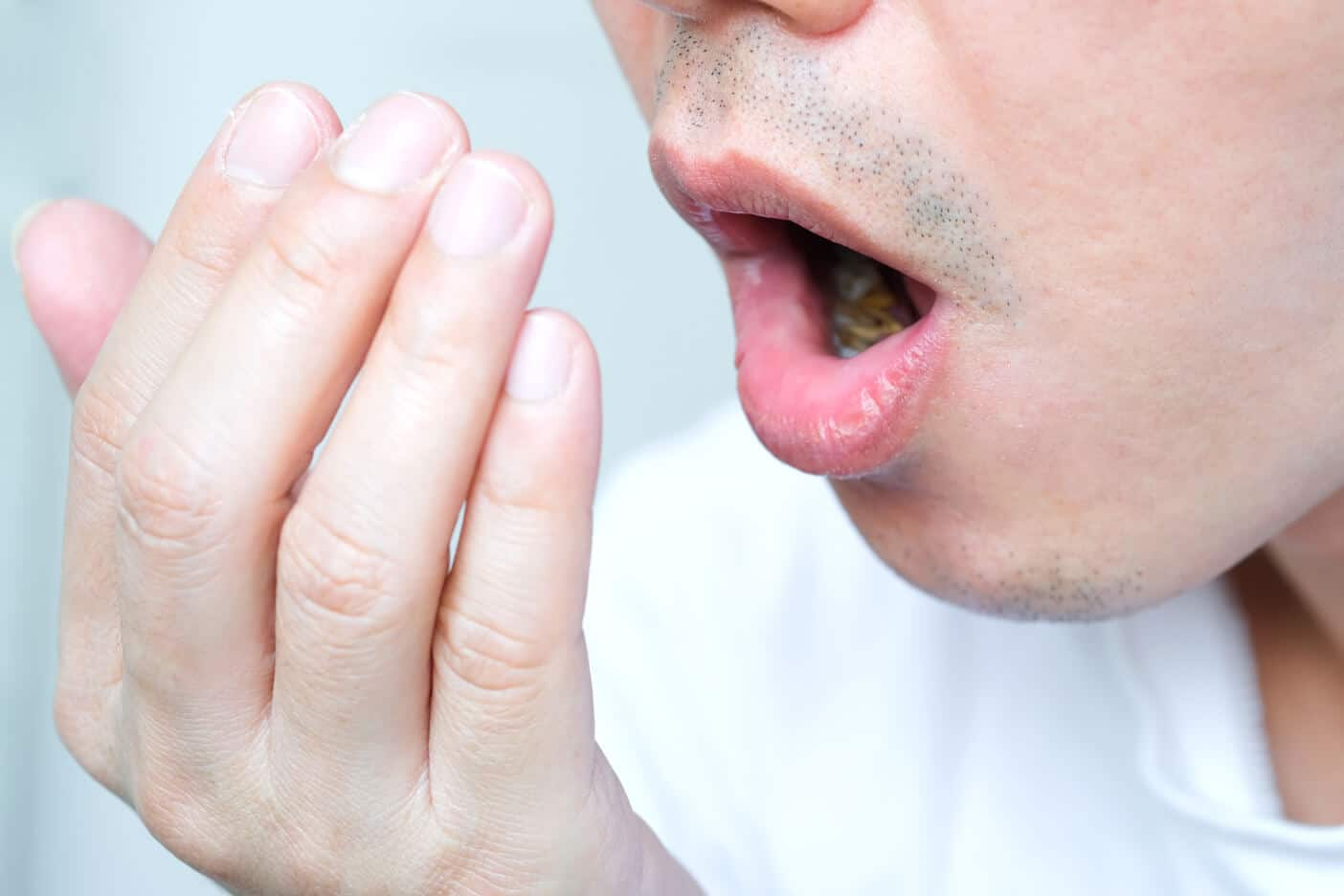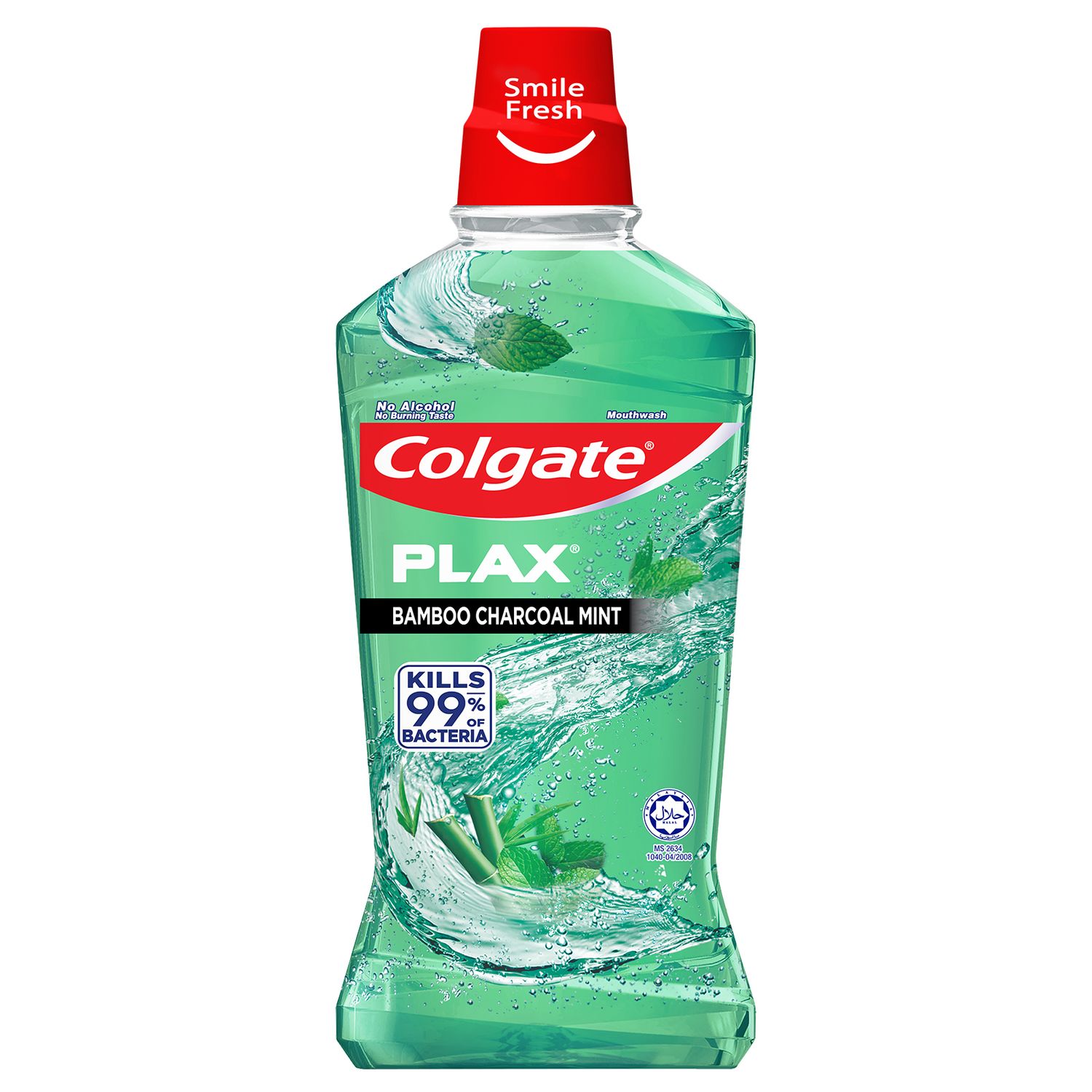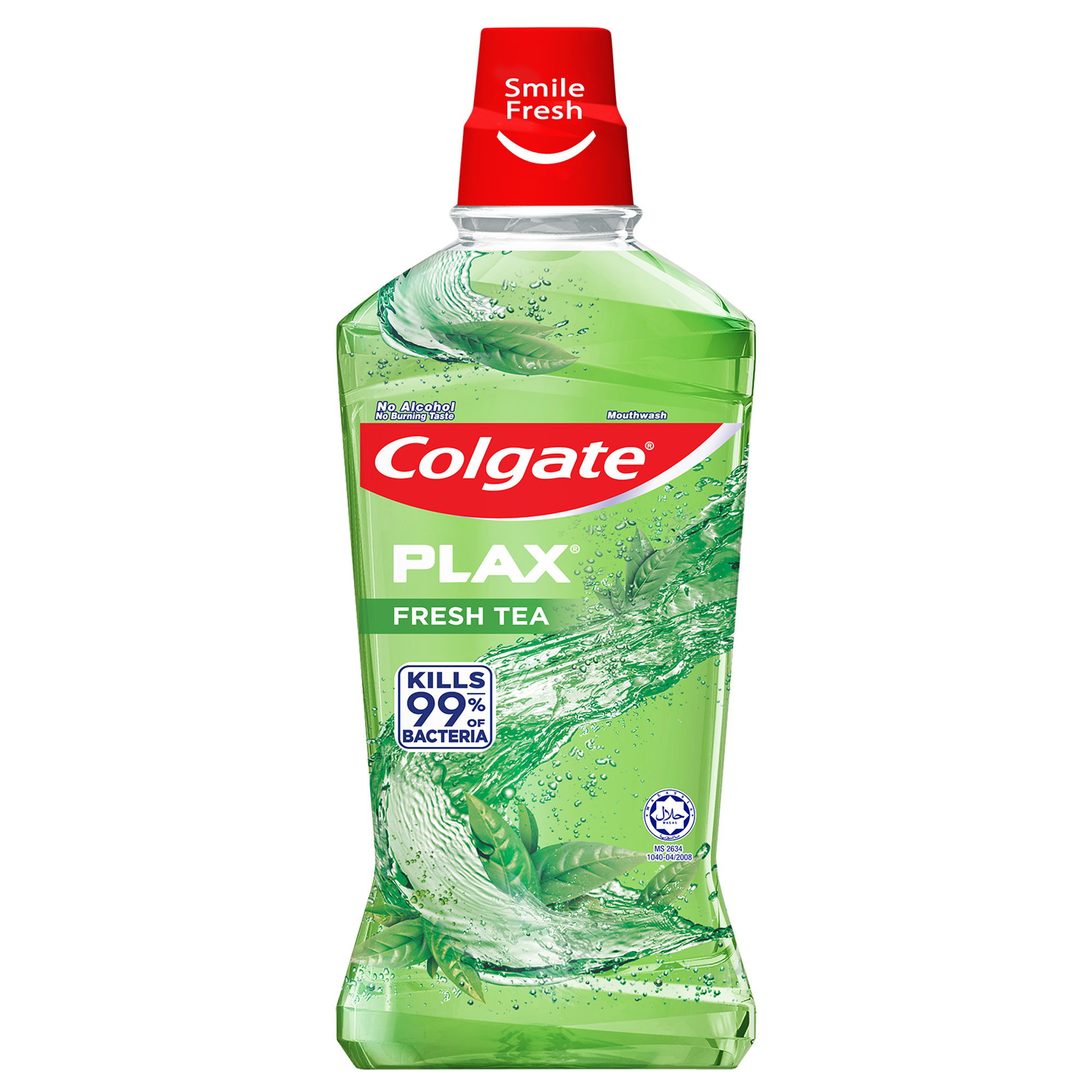What is Bad Breath (Halitosis)?
Bad breath or halitosis is a condition where an unpleasant odour is detected when a person exhales. It can occur from time to time or may be a long-term concern. It is often a result of poor oral hygiene and bacterial buildup in the mouth, though other causes are likely.
Not all unpleasant odours of the breath are alike. Different types of bad breath smells can give clues to the underlying issue, whether dental or non-dental. Here are the common bad breath smells and what they typically mean:
Smell of rotten eggs or cabbage - sulphur compounds released by bad bacteria
Metallic smell - dental problems like gum disease, or some medications
Fruity or sweet smell - poorly controlled diabetes
Decaying meat smell - serious digestive issues
Sour or acidic smell - stomach acids from acid reflux or gastroesophageal reflux disease (GERD)
Fishy smell - kidney problems
Major Symptoms of Bad Breath
A distinct, unpleasant odour from the mouth is one of the most obvious signs. However, depending on the underlying causes, you may notice other halitosis symptoms such as:
Persistent bad or bitter taste in the mouth
White coating on the tongue
Dry mouth or a sticky feeling
Burning sensation at the back of the tongue or in the throat (in some cases)
People may step back or cover their nose discreetly while talking to you
Often, you may not even realise you have a bad odour in the mouth. Hence, it only helps to visit a dentist regularly to properly check and manage the issue. It helps identify more serious problems like gum disease or digestive issues, if the symptoms persist.
What Causes Bad Breath
Identifying what causes bad breath is key to treating it effectively. The most common cause of bad breath in humans is of oral origin. However, non-oral causes such as underlying health conditions can also make your breath smell bad. Below are the common halitosis causes to look for:
Oral Causes:
Poor Dental Hygiene: Not brushing, flossing, and rinsing properly. It allows plaque (a sticky biofilm of food debris and bacteria) to build up and lead to various dental problems.
Bacteria Buildup: Harmful bacteria residing on the tongue, inner cheeks, teeth, and gums can overgrow amidst poor oral care. They release foul-smelling sulphur compounds, resulting in bad breath.
Dry Mouth (Xerostomia): Dry mouth occurs due to issues with the salivary gland, mouth breathing, or due to some medicines. It is a condition where there is not enough saliva flow in the mouth. Saliva helps clean the mouth by washing away food particles and bacteria. Without enough saliva, food debris and bacteria build up, causing a bad smell in the mouth.
Tooth Decay and Gum Disease: Does tooth decay cause bad breath? Tooth decay results in cavities that trap food particles and bacteria, leading to a foul smell in the mouth. Gum disease, caused by plaque and bacteria, also causes bad breath. Persistent bad smell in the mouth is common in people with gingivitis or periodontitis.
Poorly Maintained Dental Work: Cleaning your dental appliances, like braces or dentures, through proper brushing or rinsing is essential. Otherwise, food debris and plaque can accumulate around them, causing a foul smell in the mouth.
Non-Oral Causes:
Some foods: Residues of some foods can cause a temporary bad smell. They include strong-tasting foods like garlic, onions, spices, and drinks like coffee or alcohol. They may affect your breath as they are digested. Depending on the diet, it may take many hours before the smell goes away.
Tobacco Use: Smoking and using other tobacco products leave a distinct, foul odour. It can easily lead to gum disease, which also contributes to bad breath.
Respiratory and Throat Problems: Lung, throat, or sinus infections, postnasal drip, and formation of small tonsil stones (tonsilloliths) covered by bacteria can cause foul-smelling breath.
Medical Conditions: Kidney disease, diabetes, acid reflux or GERD, and hormonal changes are also possible causes of foul breath.
Dieting and Fasting: A low-carb diet may release ketones, giving a fruity smell to breath. The digestive juices in the stomach during fasting can also cause a bad odour. Does lack of water cause bad breath? Yes, saliva flow is low when you fast or do not drink enough water. It can cause dry mouth, one of the common causes of halitosis.
When Should You Worry About Bad Breath?
Occasional and temporary bad smell in the mouth, especially after eating some foods, may be nothing to worry about. However, a chronic bad breath that persists even after brushing, flossing or using mouthwash can be a matter of concern. In such cases, knowing what causes bad breath is important to check for possible gum disease, a cavity, or a health problem.
Bad breath is usually considered a sign of poor oral health. If your bad breath condition persists for days or keeps recurring, consulting a dentist for a thorough checkup is crucial.
How to Treat Bad Breath?
Wondering how to eliminate bad breath? The right solution depends on the cause. In most cases, a mix of professional care, home remedies, and store-bought products can help.
Professional Treatments
A dental professional will first examine your mouth for possible causes, including plaque buildup, cavities, or gum disease. They may clean your teeth and gums to remove plaque and tartar buildup and fill cavities. For gum disease, a periodontist may offer the right treatment.
Your dentist may suggest alcohol-free antibacterial mouthwash and toothpaste to fight germs that cause bad breath. If the root cause is found to be non-oral, your dentist may refer you to a healthcare professional for diagnosis.
Home Remedies
Perhaps the most important home care remedy is to maintain good oral hygiene habits. Proper brushing, flossing, rinsing, and tongue cleaning are crucial. When considering how to freshen your breath, many home remedies may tempt you. They do not address the underlying causes of smelly breath, though they may help mask it. Moreover, it is important to use these remedies with caution. Here are some simple tips to freshen your breath:
Stay Hydrated: Drinking plenty of water keeps you hydrated, prevents dry mouth and helps wash away food residues. It promotes saliva flow in the mouth, helping limit bacterial buildup.
Chewing Gum: Chewing a sugar-free gum helps stimulate saliva flow. It helps wash away food particles and bacteria, besides refreshing your breath.
Oil Pulling: It is an ancient technique used by many as part of daily oral care. Swishing a tablespoon of coconut oil or sesame oil for about 10-15 minutes is considered to pull out germs and toxins.
Use Natural Breath Fresheners: Herbs like mint, cardamom or parsley can help refresh your breath naturally. They not only help mask the bad odour but also contain compounds that fight harmful germs.
Over-The-Counter Products
When considering how to cure bad breath, many opt for over-the-counter products. These include flavoured mouth rinses, toothpastes and flossing tools. Many of them can only help mask the bad breath; they do not address the underlying cause. Look for products that clean your mouth effectively and help fight bacteria. Antibacterial toothpaste and mouthwash are a great choice. Daily dental care and regular check-ups are key to good oral health.
How to Prevent Bad Breath
If you are wondering how to prevent bad breath, the first step is to improve your dental hygiene. Good dental care habits are the best way to prevent bad breath before it starts. Some changes in your diet and lifestyle also help. Having an idea of what causes bad breath helps you take action to manage dental and non-dental causes.
Brush twice daily using an antibacterial fluoride toothpaste and a soft toothbrush.
Floss once daily to clean plaque hiding between teeth.
Rinse your mouth after every snack or meal. Using an alcohol-free antibacterial mouthwash is ideal.
Use a tongue scraper after brushing to remove food debris and odour-causing bacteria on the back of the tongue.
Watch your diet; opt for foods that prevent bad breath, such as crunchy fruits, and probiotics that help control bacteria. Be mindful while using strong-smelling foods like onions and garlic.
Avoid smoking, tobacco use, and alcohol.
Drink plenty of water throughout the day.
Ensure regular dental checkups to keep your mouth clean and rule out possible dental problems.
Manage health conditions and diseases that cause bad breath.
When to See a Dental Professional
If your bad breath halitosis signs persist despite good dental care, a dental visit may be crucial. Professional care is essential if you notice signs of cavities or periodontal disease. It can also rule out the possibility of bad breath from stomach problems or other ailments. Moreover, a dentist can check your teeth and gums for hidden issues and treat them before they worsen. Timely checkups and treatment can stop bad breath from becoming a more serious problem.
Bad breath or halitosis is a problem that many people deal with. You can easily manage it with good dental hygiene and timely treatment. Proactive care by keeping your mouth clean, watching diet and lifestyle, and regular dental visits is key to prevention. Understanding what causes bad breath and taking prompt action can help keep your breath fresh and mouth healthy.
Frequently Asked Questions
How can I tell if my breath stinks?
To check if your breath stinks, you may lick your wrist, let it dry for a few seconds and then smell it. Other ways include flossing between teeth and sniffing the floss, and watching the taste in your mouth.How do I stop my breath from smelling?
Maintaining good oral hygiene with proper brushing, flossing, rinsing and tongue cleaning is key. Watching diet and lifestyle, staying hydrated, and regular dental checkups are essential.What are the main causes of bad breath?
Poor oral hygiene, cavities, gum disease, dry mouth, certain habits, foods and medications are the common causes.Why does my breath stink even after brushing?
If your breath stinks despite proper brushing, it is likely because of deeper issues. These include gum disease, respiratory tract infections, tonsil stones, stomach disorders or other health problems.How to know if bad breath is from the stomach?
A bad odour of breath that does not improve with oral care implies stomach issues like acid reflux or GERD. Bad breath from stomach problems often smells sour or acidic.














